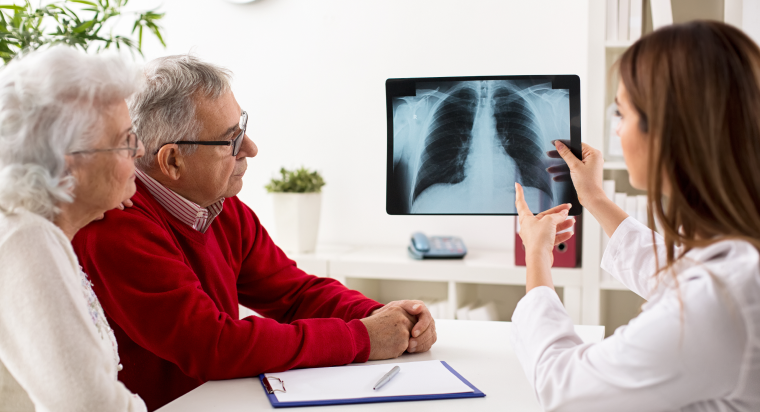Consulting a pulmonologist is crucial for effectively managing lung conditions. Here at the Pulmonary Clinic of the Carolinas, we encourage open communication and believe informed patients are empowered patients.
Here are some important questions to consider asking your pulmonologist during your consultation to ensure your intentionality about your lung health journey.
What To Ask Your Pulmonologist
-
-
- What is causing my specific lung condition?
When pondering what to ask your pulmonologist, the first question that should come to mind concerns the root cause of your problem. A thorough understanding of the root cause of your lung condition is crucial for effective treatment.
Your pulmonologist will delve into your medical history, analyze test results, and closely examine your symptoms to provide a comprehensive diagnosis. They’ll explain the underlying factors contributing to your condition in a clear and concise manner, ensuring you grasp the nature of your pulmonary disease.
- What treatment options are available, and which is right for me?
There’s no one-size-fits-all approach to lung disease treatment. Your pulmonologist will meticulously assess your specific case, considering the severity of your condition, its unique characteristics, and your overall health. They’ll outline the available treatment options, explaining the mechanism of action for each.
This will involve a detailed discussion of potential benefits and risks associated with each treatment approach. Ultimately, your pulmonologist will recommend the most suitable course of action tailored to your individual needs and preferences, ensuring you receive the most effective treatment plan.
- What lifestyle changes can I make to improve my lung health?
Often, simple lifestyle modifications can significantly improve lung function and disease management. Your pulmonologist will work collaboratively with you to identify areas for improvement. This might involve:
– Smoking cessation: If you’re a smoker, quitting is the single most impactful change you can make for your lung health. Your pulmonologist may provide resources and support systems to help you achieve smoking cessation.
– Dietary adjustments: A well-balanced diet rich in fruits, vegetables, and whole grains can significantly benefit your overall health, including your lungs.
– Exercise routines: Regular physical activity strengthens your lungs and improves your body’s ability to utilize oxygen. Your pulmonologist can recommend exercise programs tailored to your fitness level and lung condition.
– Breathing techniques: Certain breathing exercises can help manage symptoms like shortness of breath and improve lung capacity. Your pulmonologist can teach you effective breathing techniques and monitor their impact on your condition.
- How often will I need follow-up appointments and what monitoring will be involved?
Another important issue to consider when thinking of what to ask your pulmonologist revolves around the frequency of appointments.
Regular follow-up appointments are essential to monitor your lung health and ensure the effectiveness of your treatment plan. Your pulmonologist will establish a personalized follow-up schedule based on your specific condition.
These appointments may involve:
-
-
-
- Lung function tests: These non-invasive tests measure the volume of air you can inhale and exhale, along with other aspects of lung function.
- Imaging scans: Chest X-rays or CT scans may be used to visualize your lungs and identify any abnormalities.
- Blood tests: Blood tests can assess your overall health and check for any inflammatory markers related to your lung condition.
-
-
Your pulmonologist will thoroughly explain the purpose of each monitoring procedure and how the results will be used to adjust your treatment plan if necessary.
-
- What are the potential side effects of the prescribed medications?
It’s crucial to be fully informed about any potential side effects associated with your medication. Your pulmonologist will openly discuss these possibilities in detail. They’ll explain the likelihood of each sideeffect occurring, its severity, and how to manage them if they arise. Don’t hesitate to ask questions and clarify any concerns you may have regarding the medications prescribed
- Are there clinical trials available for my condition?
Clinical trials offer the opportunity to access innovative treatment options that are still under research. Your pulmonologist will stay updated on the latest advancements in your specific lung condition and inform you about any relevant ongoing clinical trials.
They’ll discuss the eligibility criteria and potential benefits and risks associated with trial participation. Ultimately, the decision to participate in a clinical trial rests entirely with you.
- Where can I find reliable information and support groups for my lung condition?
Staying informed about your lung condition and connecting with others facing similar challenges can be a valuable source of support. Your pulmonologist can provide you with credible resources, including reputable websites, patient education materials, and support groups specific to your condition.
These resources can offer valuable information, connect you with others who understand your situation, and provide emotional support throughout your healthcare journey.
- What is causing my specific lung condition?
-
At the Pulmonary Clinic of the Carolinas, our team of experienced pulmonologists is dedicated to providing comprehensive lung care. We prioritize clear communication and believe in empowering our patients through knowledge and active participation in their healthcare journey. Schedule an appointment today to discuss your lung health concerns and experience the personalized care you deserve.



 Translate
Translate

